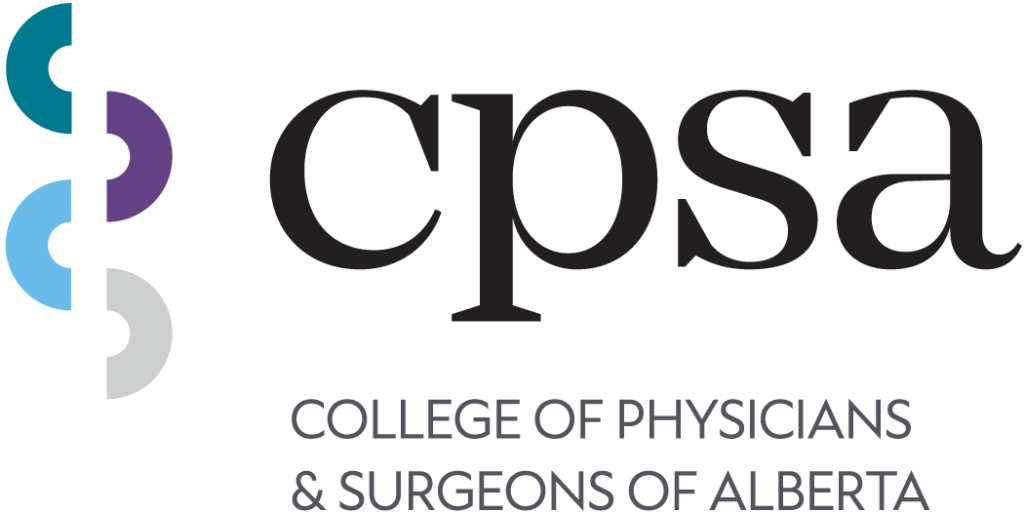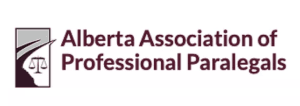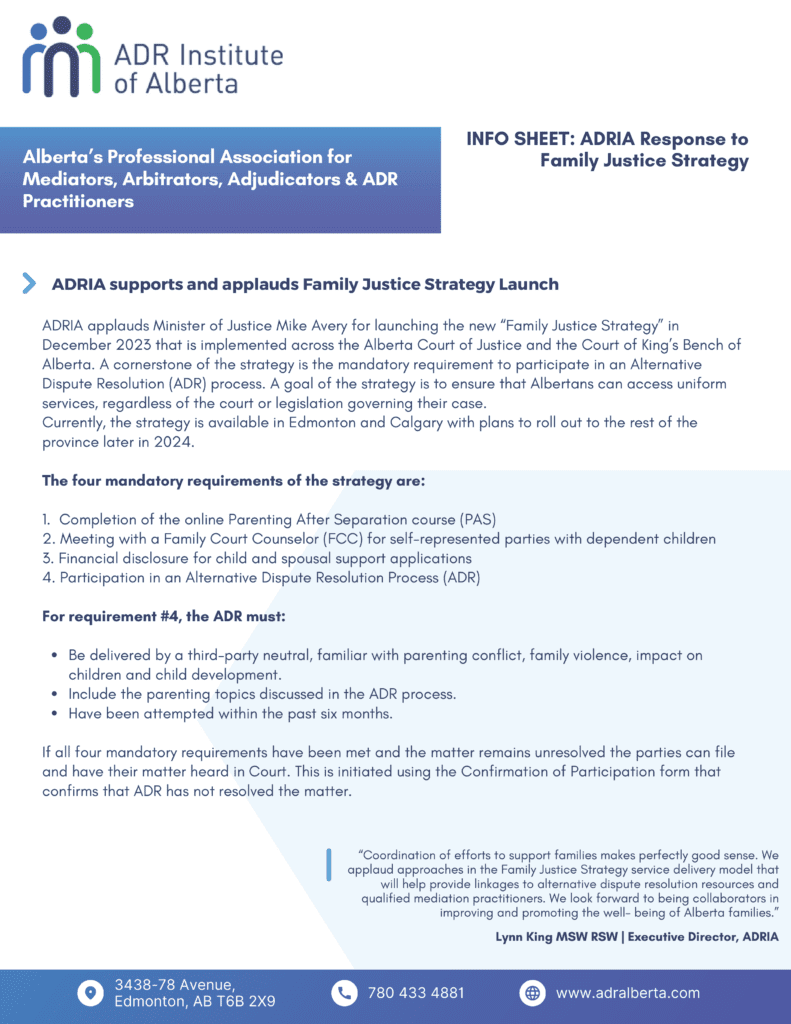
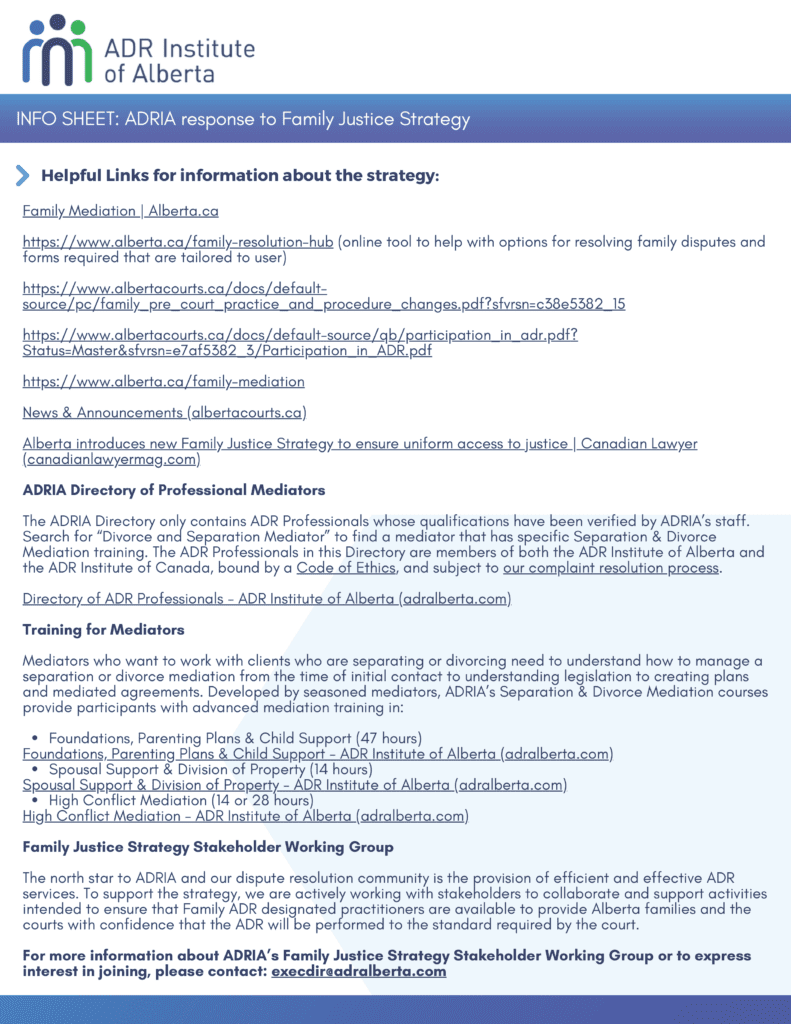

Last Updated:
Last Updated:
Construction Adjudication services in Alberta are now regulated under the Province’s Prompt Payment Construction Lien Act (PPCLA). Effective August 28th, 2022, all construction payment disputes are subject to the regulated adjudication process, and all construction adjudicators offering services under the PPCLA must be certified by a Nominating Authority (NA) appointed by the Minister Service Alberta. Visit https://adralberta.com/prompt-payment/ for more details and a link to the legislation.
Effective March 7th, 2023, ADRIA and its partners (collectively operating as ARCANA (AB)) have been granted ongoing Ministerial authority to provide NA services in Alberta for the provision of construction adjudication services. In fact, ARCANA (AB) is the only NA with delegated authority in the province, and expects to be formally appointed in the weeks ahead. ARCANA (AB) represents a collaborative partnership between ADRIA, ADR Canada (ADRIC) and the Royal Institute of Chartered Surveyors (RICS), and over a dozen roster applicants completed 40+ hours of construction adjudication training in 2022. Another training session is planned for this Spring – see the details below.
ADRIA will soon post supporting website materials and a roster of qualified adjudicators, and has already begun accepting contract payment disputes and appointing adjudicators. ARCANA (AB) is working closely with the construction industry representatives to ensure that its NA services meet the sector’s needs, and will form a standing Advisory Council to enhance services over time. Visit the ADRIA website for updates and roster opportunities in this sector, and to register for the April 20th Prompt Payment Construction Adjudication Symposium in Calgary or live stream.
<strong>ADRIA is now delivering Prompt Payment Construction Adjudication Services!</strong>Read More
Last Updated:
Intro to Improv for Mediators – Comfort in Uncertainty, Joy in Collaboration
In collaboration with the FOAJ, we presented this free Lunch and Learn webinar: Improv for Conflict Resolution on December 15, 2022 at 11:30am.
As mediators, we aim to solve problems without preconceptions of what should happen. It’s an improvised process. But improvising isn’t always easy. We can get caught up in our own thoughts, try to create solutions too quickly, or feel lost when things don’t go as expected. Improv training helps us build our comfort in uncertainty, reduce our fear around relinquishing control, and find joy and ease in collaboration.
Get a taste of improv training, learn about the fascinating overlap between the principles of improv and principles of conflict mediation, and leave with some ideas for applying improv to your own work.
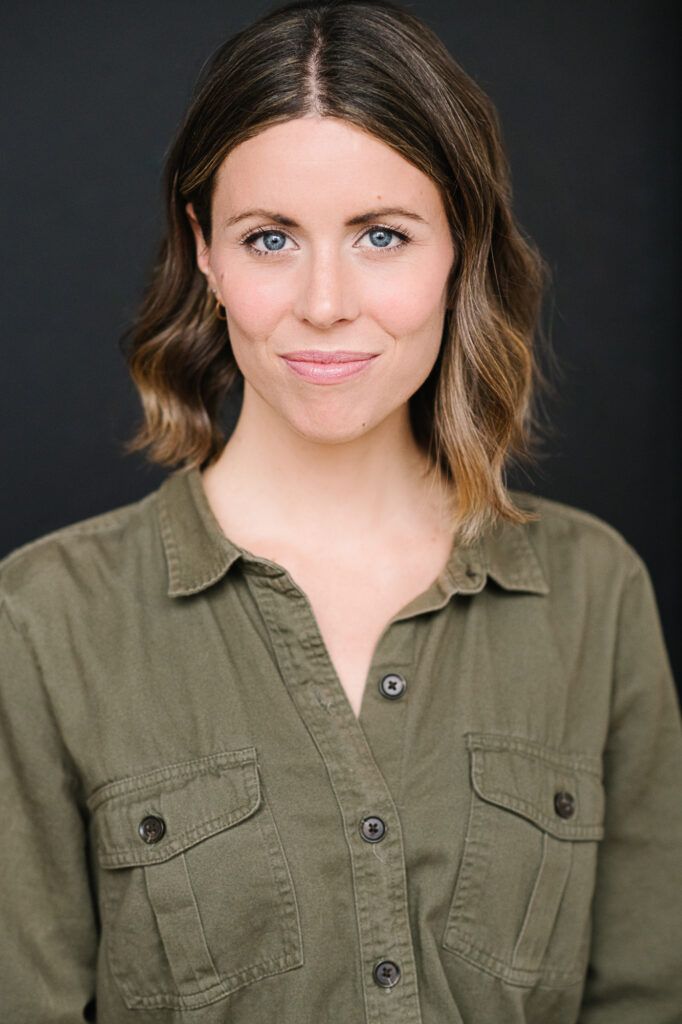
Zoë Barrett-Wood is a mediator and facilitator with the Canadian Collaborative for Engagement and Conflict Management. She has a background in the sciences and the performing arts, and believes in the power of bringing the two together. Zoë worked for a decade as an environmental consultant on complex projects related to land protection, resource development, and community health. She’s also worked as an actor, improviser, and comedian for film, theatre, and audio projects. She has been teaching improv for workplaces in the public, private, and not-for-profit sectors for the past 7 years.
This recording is from Dec 15, 2022
Free Webinar Recording: Improv for Conflict ResolutionRead More
Last Updated:
The Members Only Forum is a place for ADRIA members to connect with other ADR professionals, discuss important topics facing the industry, and share resources.
Are you a new mediator looking for the support of someone more experienced? Are you an experienced mediator interested in offering support to new & learner mediators? (“Classifieds: Support for new mediators“)
Looking for role-players to practice your mediation skills? Or, are you willing to role-play for those wanting to practice? (“Connecting mediation students and role-players“)
Are you looking to connect with experienced arbitrators to support you with your learning journey? Are you an experienced arbitrator willing to support a learner arbitrator? (“Connecting new arbitrators with mentors“)
What does it even mean to be a mentor? (“What is a Mentor?“)
Post on our members forum to connect with other professionals in ADR.
Forum Guidelines
Make sure you read the Forum Guidelines before posting.
Login Required
As this is a members only forum, you will need to have your membership up-to-date and be logged in before you can read or post in the forum. Otherwise you will get an error message.
Check out some of the mentorship opportunities already posted on the Members Only Forum!
Looking for a Mentor? Connect on our Members Only ForumRead More
Last Updated:
Secondary stress is emotional duress that can result from exposure to another person’s first hand traumatic experience. With trauma-informed tools we can build resilience for our service providers so they can best support the people they serve.
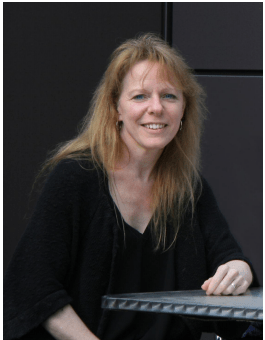
Dr. Suzette Brémault–Phillips is an Occupational Therapist and Associate Professor in the Department of Occupational Therapy, Faculty of Rehabilitation Medicine, University of Alberta, who holds a PhD in spirituality. She is also the Director of the Heroes in Mind Advocacy and Research Consortium (HiMARC), a provincial hub for research, teaching and service in support of military members, Veterans, public safety personnel and their families. An experienced clinician, educator, researcher, and consultant, she has worked in a variety of settings across provinces, health care systems and the lifespan. Her expertise is in the area of rehabilitation, complex needs, mental and spiritual health, trauma-informed care, and older adults. Suzette’s research interests include resilience, well-being, moral injury, novel trauma-focused.
This webinar recording is from December 1, 2022.
Webinar Recording: Secondary Trauma – Building resilience through informed careRead More
Last Updated:
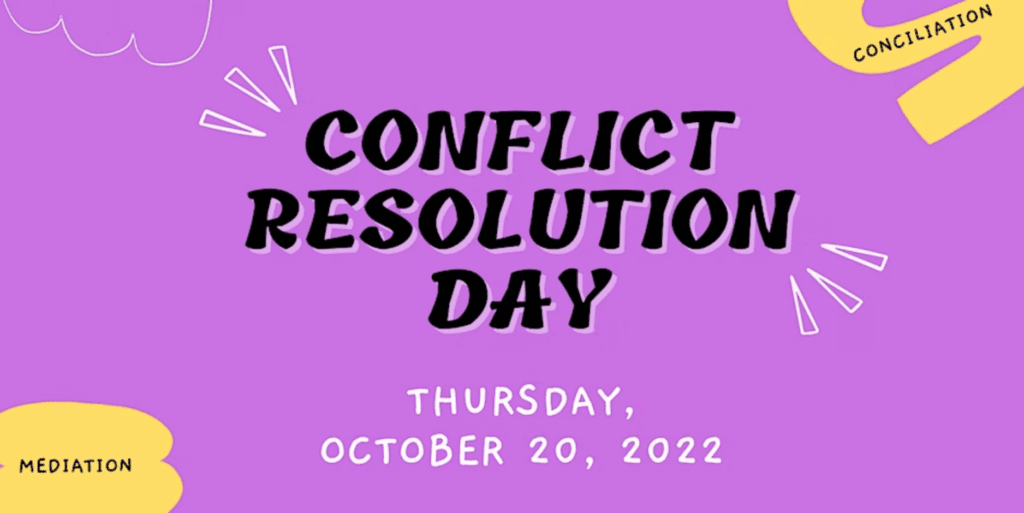
The Conflict Resolution Day Alberta Committee is a collaboration between the Alberta Government’s Dispute Resolution Network and ADR (Appropriate Dispute Resolution) organizations from all over the province, including ADRIA.
The Committee’s goal is to get Albertans talking about their options to work through conflict in a positive and productive way.
You can find out more about the committee and Conflict Resolution Day on the website: http://www.conflictresolutionday.ca/
Conflict Resolution Day is October 20, 2022 this year with the theme: Mind Your Bias.
Please join on October 20, 2022 at 12:00 P.M. to learn skills about how to mind your bias!
Minding our bias can teach us how to welcome diverse perspectives, close the distance between perspectives, and find common ground with our neighbours again. Our workshop will shed understanding of biases, clarifying when a bias may be in play and offer tangible skills that help participants move from recognition to recovery. With this understanding, you will be able to communicate with each other in a way that sheds light on the perspectives that are gained from clear communication.
During the presentation you’ll learn how to define and recognize biases, learn about the science behind biases, see how biases can be recognized in an environment, and learn strategies and communication tools to minimize the impact of biases.
October 20, 2022 at 12 PM – 1PM
Free, Online
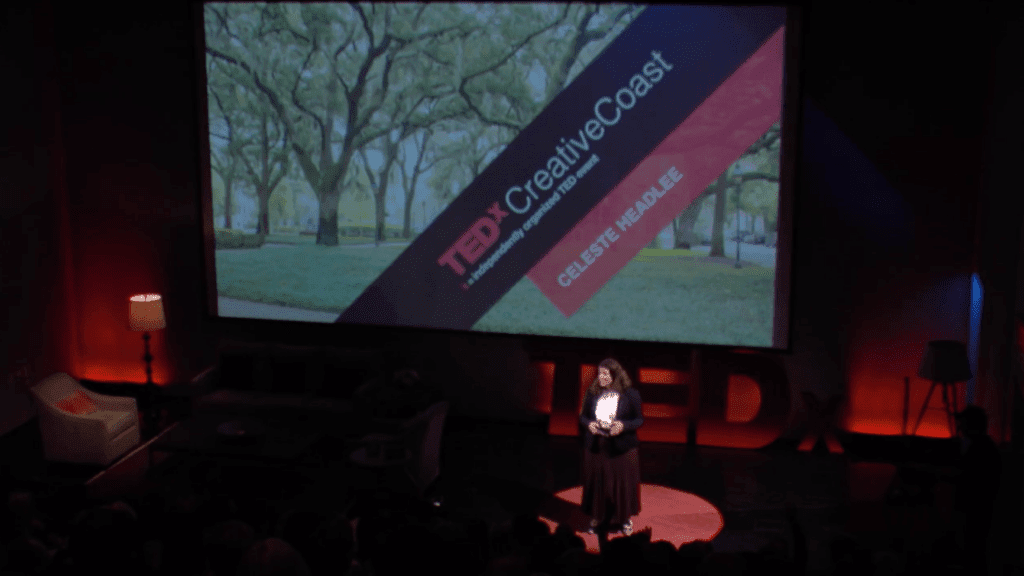
In our louder and louder world, says sound expert Julian Treasure, “We are losing our listening.” In this short, fascinating talk, Treasure shares five ways to re-tune your ears for conscious listening — to other people and the world around you.
When your job hinges on how well you talk to people, you learn a lot about how to have conversations — and that most of us don’t converse very well. Celeste Headlee has worked as a radio host for decades, and she knows the ingredients of a great conversation: Honesty, brevity, clarity and a healthy amount of listening. In this insightful talk, she shares 10 useful rules for having better conversations. “Go out, talk to people, listen to people,” she says. “And, most importantly, be prepared to be amazed.”
William Ury, cofounder of Harvard’s Program on Negotiation, is one of the world’s best-known and most influential experts on negotiation. William Ury explains how listening is the essential, and often overlooked, half of communication. His stories of candid conversations with presidents and business leaders provide us with impactful lessons, such as understanding the power of a human mind opening up. He asks us to join a listening revolution, and promises that if we all just listen a little bit more, we can transform any relationship.

Could the antidote to racism be enchantment? Chloe Valdary thinks so. Theory of Enchantment is a radical approach to anti-racism rooted in understanding that celebrates the complexity of the human spirit. Since racism derives from deep insecurities projected onto others, the work of enchantment includes shadow, acknowledges personal complexity, and affirms right relationship with self. Diversity need not be division, and inclusion does not discount differences.
Empathy does not ‘fix’ but accompanies another’s suffering, and criticism can be used to uplift and empower. Valdary’s fulsome framework—from workshops to a self-paced online course–includes myth, literature, religion, and Jungian concepts.
Theory of Enchantment reaches beyond conflict resolution for connection with universal principles of humanity, healing, and wholeness. It is a life practice and personal discipline that teaches that we can–actually—root everything we do in love and compassion.

In celebration of Conflict Resolution Day, Values Based Living is offering free access to their Know Your Values online course. Enter coupon code CRDAYFREE at checkout.
Values Based Living combines conflict resolution, self-inquiry, and neuroscience to help people learn to live in alignment with their values.
In this course, you will explore:

The Approaching Conflict with Confidence series is online training to learn practical skills to better manage conflict at work and at home.
This series is for people without a background in ADR and who aren’t looking to become a mediator but would like to become more effective at managing conflict in their personal and professional lives. Through interactive online training, you will learn the theory and practice the skills to resolve conflict effectively.
Take one course in the series or combine them to enhance your learning and skill development.
Upcoming Course Dates:
211 Alberta Resource – Find Community and Social Services
211 is a helpline and website that provides information on and referrals to Alberta’s community, social, health-related and government services. The vision for 211 Alberta is to be the primary source of information and gateway to human services for individuals and planners.
Credit Counselling Society
Credit Counselling Society is an award winning, non-profit service, helping individuals and families find their best options to deal with their debt and get their finances back on track.
MyMoneyCoach
MyMoneyCoach.ca is a free public service provided by the Credit Counselling Society. The website objectively shows average Canadians how to save money on their everyday living expenses and how to make smart financial choices.
Mediation and Restorative Justice Center
Do you have a disagreement with your neighbours or family and don’t know what to do? The Mediation and Restorative Justice Center can help you to resolve difficult conflicts or disputes that may arise between you and your family members, neighbours, members of your community, people at work, or fellow participants in groups or activities by facilitating a meeting with the person or people you are having a dispute with.
Strathcona County Community Mediation Services
Problems with your neighbours? Strathcona County Community Mediation (SCCM) can help. Living together in a community can be challenging. Not all people experience events in the same way and when you find you are in conflict – there is help. Mediation provides the time, space, process, and facilitators to have an open and honest and respectful conversation to gain understanding of one another’s concerns and together, to explore options for resolving it.
Community Mediation Calgary Society
Community Mediation Calgary Society (CMCS) is a registered charitable not-for-profit organization with trained volunteer mediators who provide a safe space for open and effective conversation. The end goal is to develop understanding and empathy between participants, so they can reach a mutually agreeable resolution.
Last Updated:
The UN is marking the International Day of Older Persons on October 1 by encouraging countries to draw attention to and challenge negative stereotypes and misconceptions about older persons and ageing, and to enable older persons to realize their potential.
We compiled a few resources of interest for those interested in Alternative Dispute Resolution:
International Day of Older Persons on October 1, 2022Read More
Last Updated:
September 30 is Orange Shirt Day as well as the National Day for Truth and Reconciliation.
Andrea Menard (she/they/ᐃᐧᔭᐋᐧᐤ wiyawâw), a member of our Board of Directors at ADRIA, produced a powerful video through her work as the Lead Educational Developer for Indigenizing Curricula and Pedagogies at the University of Alberta. In the video, Andrea speaks of the importance of recognizing September 30th as both the National Day for Truth and Reconciliation as well as Orange Shirt Day. Watch their powerful video about why it matters, and how we move in truth toward reconciliation.
Join us in taking action to mark this national holiday by committing yourself to learning more. You may want to make space in your day on September 30th to take in a variety of learning resources including these below:
Watch the ADRIC recordings on Diversity in ADR, including:
Mark Orange Shirt Day & National Day for Truth & Reconciliation on September 30Read More
Last Updated:
While we all know there is a requirement to treat our colleagues, clients, and others we interact with at work with dignity and respect, sometimes inappropriate interactions creep in without our awareness or recognition.
This introductory presentation covers:
Ruthann Weeks is a People and Culture Strategist and founder of Harmony In The Workplace. She is a change agent whose efforts have helped to bring the importance of an abuse-free work environment to the forefront of public awareness. She is an author and gifted keynote speaker who delivers a powerful message about today’s workplace challenges.
Working as a Certified Resource Specialist in the human service sector, Ruthann went on to graduate as a Human Resource Manager. She is a Certified Psychological Safety Advisor and specializes in leadership development, people and culture, diversity and inclusion, workplace bullying, sexual harassment, domestic violence, and mental health in the workplace.
Workplace Harassment: Expected and Prohibited ConductRead More
Last Updated:
In this video Leila Gosselin discusses the essential requirements for an effective decision. She shares how to write an effective decision designed for the related audience, including the legal requirements for administrative decision makers. She addresses two main motives/explanations on what makes a written decision ineffective or futile. Leila shares a sample of a decision writing structure and the steps for effective decision writing.
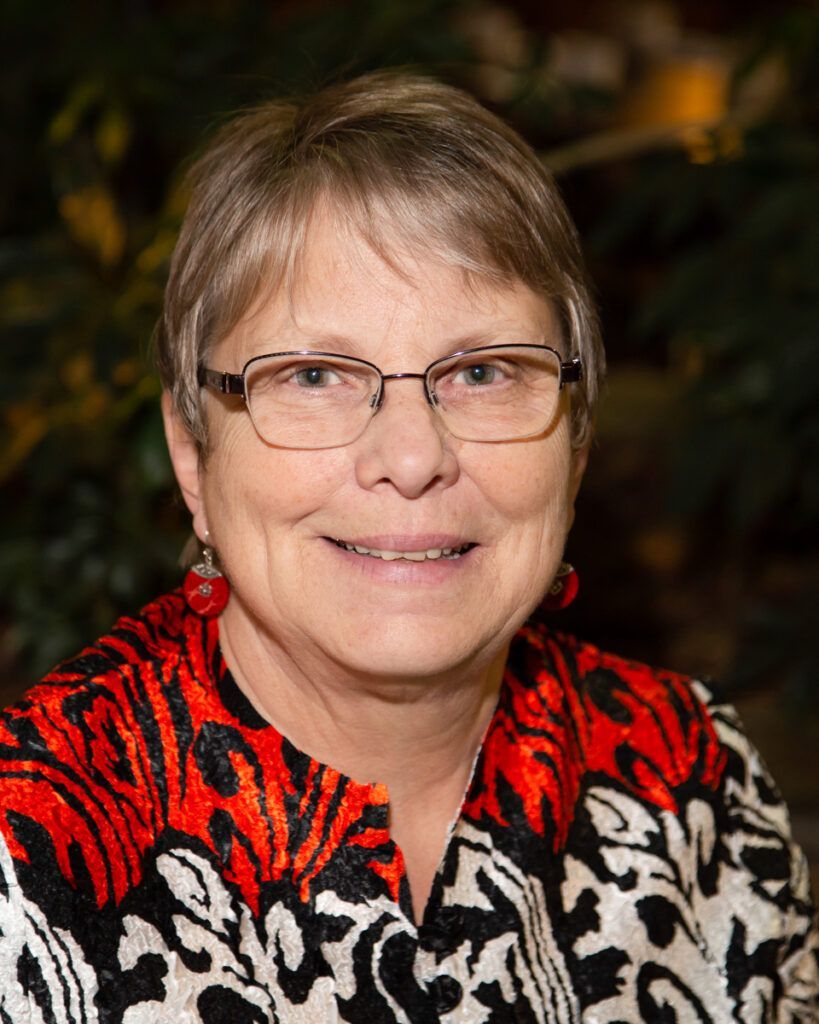
Ms. Gosselin is a retired lawyer who practiced in the area of administrative law.
She received her B.A. (Criminology with Distinction 1986), and LL.B. (1989), from the University of Alberta. She articled with The City of Calgary Law Department in 1989 and was admitted to the Alberta Bar in 1990. She received her Chartered Mediator status in January 2000.
Ms. Gosselin has appeared before several administrative tribunals including the Labour Relation Board, Human Rights Commission, Land Compensation Board, Assessment Review Board, Municipal Government Board, and Livery Transport Services Board. Ms. Gosselin has appeared before all levels of court in Alberta, as well as the Supreme Court of Canada.
She is a senior instructor with the Foundation of Administrative Justice (FOAJ) and holds her Certificate in Tribunal Administrative Justice™ offered by FOAJ.
Decisions, Decisions – How to Write them SuccessfullyRead More
Last Updated:
Support for the regulation of mediation in Canada has waxed and waned over the years. Many practitioners agree that some form of oversight is needed although many cannot agree why. One of the strongest arguments against regulation is the cost involved to set up regulatory bodies which would likely mean higher professional membership fees for mediators. But there is more than one way to consider regulation and in this webinar we hear about the experience in Ireland with its Mediation Act, 2017 and if this model should be considered in Canada.
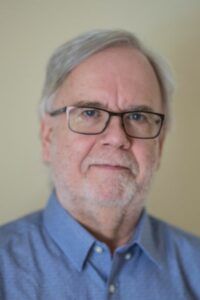
Presenter: Colm Brannigan
Colm Brannigan is mediator and arbitrator in the Toronto area. He is a Fellow of the Chartered Institute of Arbitrators, holds an LL.M. in ADR, and is a Chartered Mediator and a Chartered Arbitrator through the ADR Institute of Canada (ADRIC).
An acknowledged Canadian expert in the development of online dispute resolution and med-arb processes, he is the first person to receive the Chartered Med-Arb designation from ADRIC.
Colm is a frequent speaker at continuing education webinars, programs and conferences and has taught ADR in the Faculty of Law at Queen’s University. He is a founding member of the Canadian Collaborative for Engagement & Conflict Management (https://www.c4ecm.ca/) an innovative group dedicated to ADR training and best practices.
Colm can be contacted by e-mail at colm@mediate.ca or through his website www.mediate.ca.
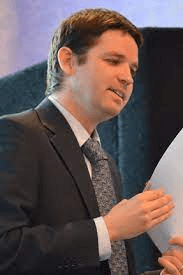
Presenter: Paul Pierse
Paul Pierse is a lecturer on the LL.B. in Irish Law, the Certificate in Mediation and the Certificate in Dual Career Development (Sports).
From Listowel in County Kerry, Paul obtained an honours degree in Commerce and German from the National University of Ireland, Galway, before being admitted on to the roll of solicitors by the Law Society of Ireland and Certified to practice as a Mediator by the Mediators Institute of Ireland. Paul has developed a keen interest in mediation as an alternative to litigation and actively promotes its use in appropriate circumstances. He was instrumental in the inclusion of a separate module on Mediation in the LL.B. (Hons) in Irish Law in Griffith College – a first in Irish third level education.
Paul is recognised as amongst the most established lecturers in delivering third level education through blended delivery. Having just completed his PGDip in Teaching and Learning at the time, Paul was selected as part of the pioneering cohort of lecturers when the LL.B. (Hons) in Irish Law was first launched via blended delivery.
Paul continues to lecture a number of core modules on this successful course.
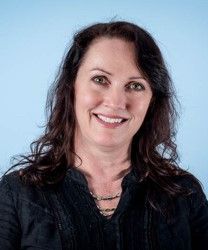
Presenter: Dr. Roisin O’Shea
Róisín is a former Irish Research Council scholar, who was awarded a Ph.D. in 2014 for her doctoral research on Judicial Separation and Divorce in the Circuit Court, Ireland. She has significant experience as a mediator completing hundreds of cases since 2009 including Family, Work-place, Farm family, SME mediations, Commercial disputes, Succession disputes, Wards of Court and EPA (Enduring Power of Attorney) disputes and Personal Injury claims. Many of these cases have been referred to Róisín after legal proceedings have been initiated, and the majority of cases subsequently came to a mutually satisfactory agreement.
This recording is from our February 17, 2022 Webinar:
Last Updated:
Imagine what the world could look like if we had more awareness or were more skillful in providing constructive feedback to each other!
Jules utilizes “Active Engagement” (the art of active noticing and mindfulness) as a principled way to help teams, clients and consultants, families and loved ones have honest and safe conversations with each other. He promotes self reflection and being more aware of our own behaviors and actions to see if they are in alignment with our espoused values. Are they in sync?
Perfect lessons and reminders as we re-emerge into a new world post Covid world.

Jules LeBoeuf is a registered forestry practitioner with the College of Alberta Professional Forest Technologist with 35 years of experience in natural resource management. A career ranging from working in the field as a forest officer to senior manager in Wildfire Management has reinforced the importance of dialogue in building trustworthy relationships on the landscape or in the corporate boardroom. His insight into natural resource management and human factors has enabled him to help teams solve substantive problems more effectively through reflective dialogue practices. As a neutral third party facilitator he assists a broad range of individuals and teams based on the core principles of transparency, supporting free informed choice, creating safe places to talk together and taking time to build shared understanding with intent to take action.
He has completed a 2-year certification practicum for facilitators and trainers in the art and science of the practice of Active Engagement hosted by The Centre for Contemplative Dialogue located in Georgetown, IN, USA. He is an active faculty member and trainer/facilitator on workshops and practicums sponsored by the Center for Contemplative Dialogue and currently working as a senior manager with the Government of Alberta, department of Environment and Parks.
This recording is from our December 14, 2021 ADR Webinar:
Webinar Recording: Introducing a Contemplative Practice into your PracticeRead More
Last Updated:
Remembrance Day commemorates the moment armies stopped fighting and officially ended the First World War. We can honour and recognize those who have served and continue to serve during times of war, conflict and in international peacekeeping activities.
This year is the 100th anniversary of the Remembrance Day Poppy in Canada.
The poppy is not only an important symbol but also offers a fundraising opportunity; legion members and other volunteers distribute Poppies, and gratefully accept donations to the Poppy Fund.
With the ongoing restrictions due to the pandemic, you can attend a virtual Remembrance Day ceremony like the National Ceremony in Ottawa. You can also search for activities in your local community (eg. see item 4 below).
With our poppies on our lapel and with plans to attend an online ceremony, what other ways can we honour Remembrance Day and promote peacebuilding activities year round?
If you know a Veteran or someone who has been involved in peacebuilding, reach out to them and say a heartfelt “Thank you”. You can also add some Words of Remembrance to the Legion’s online gallery. Remember that saying thank you shouldn’t only be confined to November 11.
Spend some time each day quietly reflecting on how we would like to relate to ourselves and others and how we can promote peaceful relationships. Think about if there are any conflicts in your life that could use some peacebuilding. Examine your habits and media consumption to see if there are any channels influencing conflict and harmful beliefs about other groups of people.
This activity is a great way to remember beyond just one day a year. You can plant a tree or a garden in honour of those who have sacrificed for us and as a reminder to strive for peace. The Legion sells poppy seeds for just this purpose.
If you get the opportunity, plan to visit the Canadian War Museum, The Military Museums of Calgary or other local history museums. If you prefer to learn from the comfort of home, The Canadian War Museum has online resources for you to explore. The Canadian Clubs of Alberta are hosting a webinar on Canadian Sacrifices in WWI on Nov 17th. You can also check out some Remembrance Day book recommendations from the public library.
Take some time to update your knowledge on some of the current conflicts around the world. Learn about the social conditions that can deteriorate well-being of individuals and communities such as poverty and discrimination. Learn about inequalities in human rights, health care, opportunities, safety and security. Find ways for dialogue and collaborative interaction with people who have diverse backgrounds and different perspectives.
Volunteering to help Veterans or at a center for new immigrants. You can learn first hand from Veterans and give back in a small way. By volunteering with new immigrants, you will learn about different cultures and learn about the hardships people face when they are resettling. Ask what you have to offer to others and learn what they can share with you.
Connect with kids in your life to impart peacebuilding on the next generation. There are many activities you can do with kids while discussing Remembrance Day. The Legion has some suggested learning activities and crafts. You could paint poppies on rocks and place them at a cenotaph or on the gravestones of Veterans.
Strive for connection and harmonious relationships in your life, both with those you are close to and to greater humanity. Practice forgiveness and make a commitment to acts of kindness to others.
Learn about constructive ways to manage differences and resolve conflict.
If you are new to Alternative Dispute Resolution, you could try our course, Managing Conflict. Managing Conflict is designed to give you the basic skills you need to more effectively manage conflict.
If you’re looking for more professional training, you could take Communications in ADR. We have sessions coming in 2022 in Edmonton and in Calgary. This course introduces students to the causes and effects of interpersonal conflict, with particular emphasis on the dynamics of conflict, conflict resolution styles and the cycle of conflict.
If you’re an ADR professional, you may want to specialize in Restorative Justice and Peacemaking Circles. Learn about Restorative Justice and its application in the criminal justice system with an overview of the values, goals and principles guiding victim-offender dialogue. Gain knowledge of how peacemaking circles are being used in a wide variety of settings.
Talk about local heroes who promote peace. Examples can include teachers, firefighters, neighbours, and kids! Find role models to inspire you and like-minded others for support. Find and share positive information about successful peace initiatives.
Most importantly, make a habit of reflecting on the freedoms and peace in your life, and to remember the humans and animals who served and sacrificed for all we have today.
10 Ways to Honour Remembrance Day & Take Action Towards PeacebuildingRead More
Last Updated:

Our world is changing in so many ways and this means our manner of communication is changing. With covered faces and virtual meetings, we must rely more on the intention of the words that are being used to relay messages.
This workshop shows us how to bring kindness into communication by exploring the differences in and value of both empathy and sympathy, create empathic statements and how empathic responses can diffuse conflict and improve relationships. We look at the importance of being aware of alternate cultural responses in communication and how conflict can bring new insight and understanding to your personal and professional interactions.
Being kind in communications requires awareness, strength and courage.
Kindness and Communication Workshop – Conflict Resolution Day 2021Read More
Last Updated:
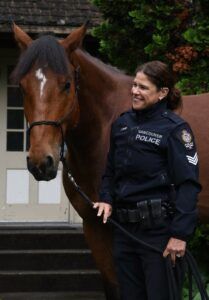
Susan Sharp is the Sergeant in charge of the Vancouver Police Department (VPD) Mounted Unit.
A 22-year member of the VPD, Susan has worked in various operational positions in surveillance, property crime, and the Court and Detention Services section.
She is also a member of the Crisis Negotiator Team, where she is a Negotiating Liaison Officer who advises the Critical Incident Commander .
Susan shared some of her stories about what it’s like to be a police officer on horseback in Vancouver’s Stanley Park. She also shared some of the strategies her team uses when communicating with a person in crisis or negotiating with a high-risk subject.
This recording is from our September 29, 2021 ADR Webinar:
From Horses to Negotiating – A Day in the life of a Vancouver police officerRead More
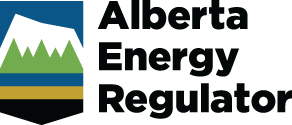

780-433-4881
info@adralberta.com
Edmonton Office
*New Address as of Jan 1, 2023*
3438 78 Ave NW
Edmonton, AB T6B 2X9

